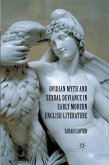Focusing on works by Shakespeare and Spenser, this study shows the connection between visuality and ethical action in early modern English literature. The book places early modern debates about the value of visual experience into dialogue with subsequent philosophical and ethical efforts.
"Knapp combines sensitivity to things seen with considerable philosophical subtlety. This book will appeal most of all to those steeped in the work of phenomenologists and prepared to approach poetry through their eyes." - Renaissance Quarterly
"More than any other book in recent Renaissance studies, Knapp's makes a convincing case for the need to return to the riches of phenomenology, not for the sake of making the Renaissance 'relevant' to contemporary debates (although he does this admirably), but so that we can see the convergence of both periods on basic questions about the body, sympathy, reason, and vision - questions that have occupied philosophical and religious discourse for a very long time." - Michael Witmore, Professor of English, University of Wisconsin, Madison
"Image Ethics in Shakespeare and Spenser represents a profound and thoughtful engagement with the drama of moral decision in Shakespeare and Spenser. Working with philosophical, theological, and scientific texts from both Renaissance letters and contemporary thought, Knapp movingly demonstrates the intimate role that mental and physical images play in an embedded and embodied ethics experienced in time. Throughout this book, Knapp reads Scripture not for dogmatic prescriptions but for phenomenological accounts of how we live and love through acts of looking." - Julia Reinhard Lupton, The University of California, Irvine
"More than any other book in recent Renaissance studies, Knapp's makes a convincing case for the need to return to the riches of phenomenology, not for the sake of making the Renaissance 'relevant' to contemporary debates (although he does this admirably), but so that we can see the convergence of both periods on basic questions about the body, sympathy, reason, and vision - questions that have occupied philosophical and religious discourse for a very long time." - Michael Witmore, Professor of English, University of Wisconsin, Madison
"Image Ethics in Shakespeare and Spenser represents a profound and thoughtful engagement with the drama of moral decision in Shakespeare and Spenser. Working with philosophical, theological, and scientific texts from both Renaissance letters and contemporary thought, Knapp movingly demonstrates the intimate role that mental and physical images play in an embedded and embodied ethics experienced in time. Throughout this book, Knapp reads Scripture not for dogmatic prescriptions but for phenomenological accounts of how we live and love through acts of looking." - Julia Reinhard Lupton, The University of California, Irvine








